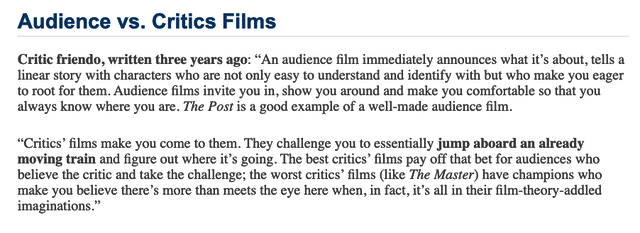Yesterday I posted a three-year-old passage from “critic friendo” about the difference between critics vs. audience films. Today he followed up with his own rundown about which 2021 Best Picture contenders are which:
Audience films: Judas and the Black Messiah, Promising Young Woman, Chicago 7 (despite being nonlinear), maybe Minari (though the subtitles are a stopper for a lot of people).
Critic films: Mank (non-linear, inside-Hollywood, b&w); The Father (too confusing and non-linear); Nomadland (not enough plot, slow, too real); Sound of Metal (a critics film despite the great performances — too oblique, forces the audience to figure out too much, that metal scene would turn a lot of viewers off).
HE response: But of course, “confusing” is exactly the point of The Father, especially from poor Tony Hopkins’ (and also the audience’s) point of view, no?
It’s very clear soon enough that we’re in the same trap — forced like Tony to grapple with dementia — confused, dumbfounded, outraged, disoriented and uncertain who or what to trust. That’s precisely the strategy.
I get what you’re saying. Or what you suspect a significant portion of the audience may be saying to themselves as they watch. That however audacious Florian Zeller’s strategy may be, it follows that the sun will never burn off the fog — that there will be no eventual sorting out of the mystery because we know there’s no cure, no solution…escape is not an option.
And so that significant portion, you’re sensing, is saying, “Okay, we get it, brilliant move on the writer-director’s part…but no thanks.”
So they’re not saying “too confusing” — they’re saying “too confining, too repressive…we get the idea but we’d rather not submit to it, thanks all the same.”
It’s not that it’s “too non-linear” but that the nature of the mental quicksand we’re stuck inside of is all too tangible…that we’re basically in the grip of a quiet, tidy and well-mannered British horror film. From a Psycho-ish perspective we’re not in the shoes of John Gavin or Vera Miles or even Janet Leigh — we’re in the shoes of crazy Tony Perkins, ”scratching and clawing” from inside his “private trap”, and yet for all of it “never budging an inch.”.
In a way poor Tony Hopkins is grappling a bad LSD trip with no hope of Thorazine. I once went through the Mother of Bad LSD Trips when I was living in Boston way back when, and while it wasn’t exactly similar to the Hopkins nightmare I did sense that I was standing right next to a manhole of madness, and that if I looked into that manhole the darkness, like some cunning beast, might sense my vulnerability and reach out and seize me and take me down into the hole, and thst once inside I’d never climb out again.
In other words The Father, to expand a bit, is an old man’s horror film.
Critic friendo to HE: You’re overthinking. While most people would understand the dramatic scheme, not many would be willing to try to parse which was real/imagined — and that’s crucial to a lot of people: Where am I in the story?
I’d also say that, for a large swath of the over-50 audience, The Father would be a non-starter because of the subject matter, which hits too close to home for a lot of people.
Honestly, what took me a long time to figure out is that, unlike critics and movie lovers, the average person has no interest in watching something that challenges or confuses them.
Critics watch, parse, deconstruct, analyze, work at making sense — but Joe Popcorn just wants to sit back and have it fed to him in easily digestible narrative bites.
But that’s the critic’s ego for you: I can make the case for this film in such a compelling way that you will HAVE to watch and adore it the way I do. For us, it is nourishing the soul; for them, it is a distraction from the rest of their life. The last thing they want is a reminder of what the future potentially holds.










